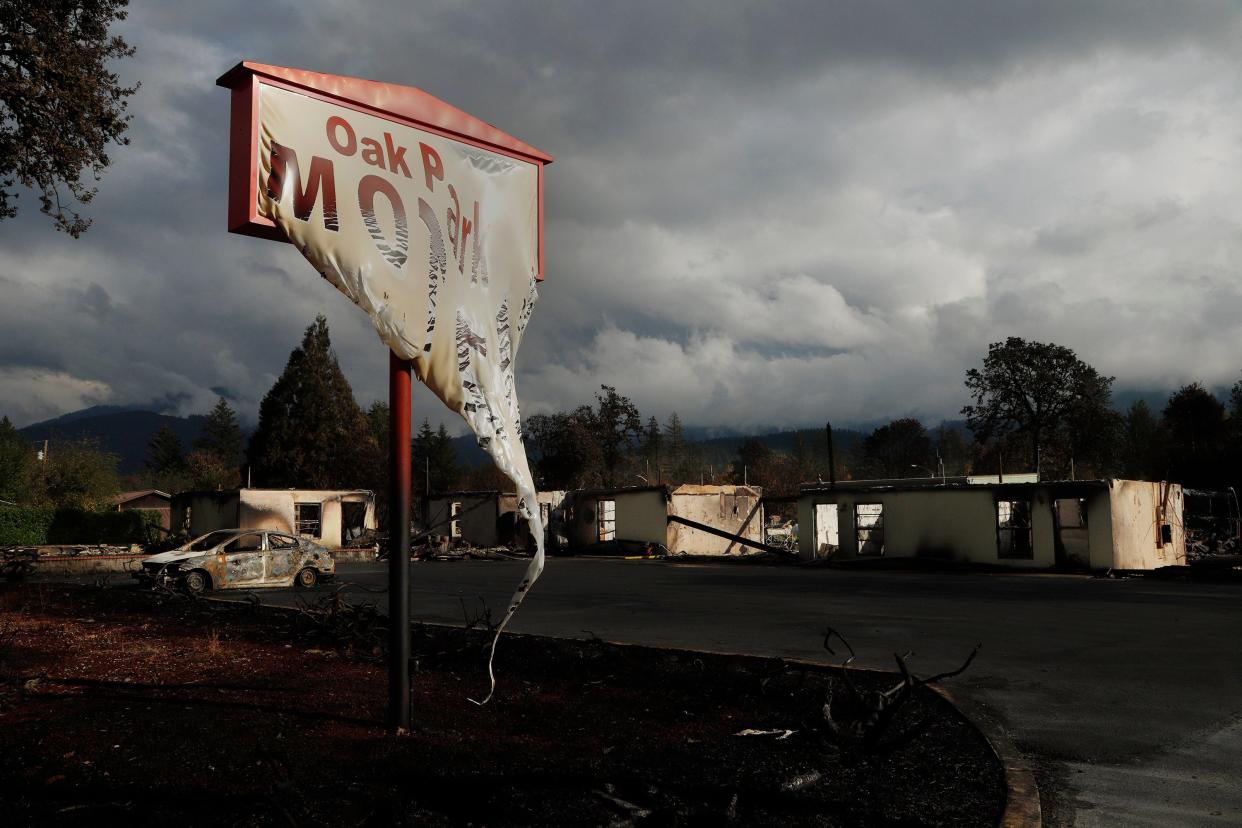Judge rules PacifiCorp can face punitive damages in Labor Day fires lawsuit

Victims in four of Oregon’s Labor Day fires could get additional compensation from PacifiCorp following a ruling Thursday from Multnomah County judge Steffan Alexander.
The circuit court judge ruled PacifiCorp can face punitive damages — in addition to compensatory damages — in a class action lawsuit that blames the utility for igniting wildfires that burned 2,500 properties.
The trial is scheduled for April 24.
Plaintiffs in the case, who include residents of the Santiam Canyon, allege PacifiCorp’s failure to maintain its power lines and shut down power during the historic wind event Labor Day night of 2020 led to the ignition and spread of the Santiam/Beachie Creek, Echo Mountain, 242 and South Obenchain fires.
The utility, which said it couldn't comment on ongoing litigation, has maintained the wildfires were an unavoidable natural disaster.
More:‘Missed opportunity?’ Records detail Forest Service response to Beachie Creek Fire before blowup
Thursday’s ruling is significant because it allows a jury, should it find PacifiCorp at fault, to impose higher damages and pay out significantly more to victims.
Previously, a jury could have found PacifiCorp liable and required they pay victims compensatory damages for things such as housing losses, displacement costs and emotional distress. By adding the option of punitive damages, basically a punishment meant to act as a future deterrent, a jury could multiply the amount paid out to victims.
PacifiCorp, which is owned by Berkshire Hathaway, could face a significant economic hit.
Why did judge allow for additional damages?
Alexander made the decision to allow a jury to impose punitive damages after reviewing evidence from plaintiffs' lawyers meant to establish PacifiCorp's negligence.
The court sets a fairly low bar for determining punitive damages can be included, and much of the evidence from plaintiffs will be presented at the trial. Indeed, Oregon has a "trial by ambush" system that means much of the plaintiffs' case won't be revealed until the trial.
Even so, they attached exhibits meant to illustrate that PacifiCorp's power lines ignited the fires, the damage wasn't caused by preexisting fires (in the case of the Santiam Canyon) and that PacifiCorp disregarded obvious signs of danger.
In one piece of evidence, plaintiffs showed communications between PacifiCorp employees noting that wildfires were springing up directly below the utility’s power lines, while also making jokes about the situation.
“God the fires near our service territories are right underneath our lines,” PacifiCorp fire data scientist Pavel Grechanuk wrote in a message to Tyler Jones, a PacifiCorp senior transmission and distribution asset performance engineer, on the morning of Sept. 8, 2020.
In another message, referencing what became the Echo Mountain Fire in the Otis/Lincoln City area west of Salem, Grechanuk wrote that “it looks like there is a fire in Lincoln City which also started under our transmission lines. Like the fire is in the transmission corridor.”
Other evidence included testimony from a fire behavior analyst who said they witnessed power lines ignite fires in the Santiam Canyon. Dean Warner, a fire behavior analyst on the Beachie Creek Fire team, testified that a “power line fell onto the chain-link fence” at the (Old Gates School) and ignited a fire and another flash occurred behind the building to the east, and there was a fire behind us.”
Other evidence focused on the fact that Pacific Power chose not to de-energize power lines, despite warnings of extreme winds and fire danger, while Consumers Power Inc. did shut down power and saw no ignitions.
“In viewing the totality of the evidence in the light most favorable to plaintiffs, plaintiffs’ evidence is sufficient to raise the jury determination of whether PacifiCorp’s conduct rose to the level of a reckless and outrageous indifference to and highly unreasonable risk of harm, and whether PacifiCorp has acted with the conscious indifference to the health, safety, and welfare of others that would warrant an award of punitive damages,” Alexander wrote.
Investigation continues:What really caused the Labor Day wildfires? What we know 2 years later
In its court filing, PacifiCorp argued the evidence did not amount to much.
“The majority of evidence and testimony cited in plaintiffs’ motion is either inadmissible, irrelevant to the four fire areas, or both," PacifiCorp lawyers wrote. "Plaintiffs also twist what little relevant evidence they do cite, casting reasonable plans as sinister, portraying employees’ lack of knowledge about other departments’ job responsibilities as reckless, and even suggesting that PacifiCorp’s regulatory mandate to provide safe and reliable electricity was somehow malicious."
What about the official investigation?
Among the strangest aspects of the trial is that the evidence presented appears unlikely to include the final investigation report from federal and state officials — which is unusual.
The U.S. Forest Service and Oregon Department of Forestry still say their investigations into the causes of the fire are "under investigation."
The lack of a government explanation for what happened sets up a scenario in which the jury trial will lack what would normally be a key piece of evidence in determining who’s at fault.
More:What really caused the Labor Day wildfires? What we know 2 years later
Zach Urness has been an outdoors reporter in Oregon for 15 years and is host of the Explore Oregon Podcast. Urness is the author of “Best Hikes with Kids: Oregon” and “Hiking Southern Oregon.” He can be reached at zurness@StatesmanJournal.com or 503-399-6801. Find him on Twitter at @ZachsORoutdoors.
This article originally appeared on Salem Statesman Journal: Judge: PacifiCorp can face punitive damages in Labor Day fires lawsuit

